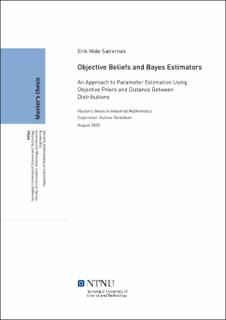Objective Beliefs and Bayes Estimators: An Approach to Parameter Estimation Using Objective Priors and Distance Between Distributions
Master thesis
Permanent lenke
https://hdl.handle.net/11250/2778378Utgivelsesdato
2020Metadata
Vis full innførselSamlinger
Sammendrag
Denne oppgaven tar for seg problemet med å estimere parametre i statistisk analyse, og i særdeleshet Bayesiansk analyse. Gitt en modell utledes objektive a priori-fordelinger for parametrene. De resulterende fordelingene blir så kombinert med Bayes-estimatorer slik at en kan finne estimater for den sanne verdien av parametrene. Vi utleder og diskuterer flat, Jeffreys og referanse-fordelinger, samt den nyere Penalised Complexity-fordelingen. Tapsfunksjoner som diskuteres inkluderer Kullback-Leibler-divergens og Fisher-informasjons-metrikken. A priori-fordelingene og Bayes-estimatorene sammenlignes med frekventistiske og fiduse tilnærminger. Eksempelet som er valgt for å illustrere teorien er en bivariat normalfordeling med gjennomsnitt null og varians lik én for begge dimensjonene. En simuleringsstudie er inkludert for å belyse hvordan estimatorene presterer. This thesis deals with the problem of parameter estimation in statistical analysis, and in particular Bayesian analysis. Assuming a given model, the main focus is on choosing objective prior distributions for its parameters. The resulting priors are combined with different Bayes estimators in order to derive estimates of the true value. We derive and discuss the flat, Jeffreys and reference priors, in addition to the more novel Penalised Complexity prior. Loss functions for the Bayes estimators include Kullback-Leibler divergence and the Fisher information metric. The priors and Bayes estimators are compared with frequentist and fiducial approaches. The example chosen to illustrate the theory is the bivariate normal distribution with zero means and unit variances. A simulation study is done to see which estimators perform well.
